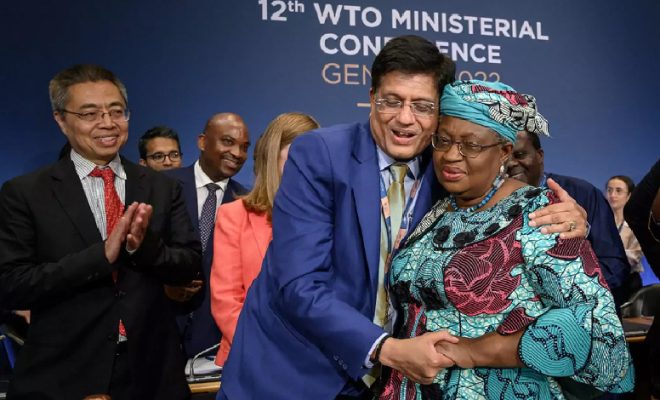India ‘Very Happy’ with WTO Conference Result

Commerce Minister Piyush Goyal has said India is “totally happy” with the result of the 13th World Trade Organization (WTO) Ministerial Conference. This is because India continues to have complete rights to protect the interests of poor farmers and small fishermen in the country.
India can continue buying food grains from farmers at assured prices and distributing them to poor people under the public distribution system without any restrictions from WTO rules. Earlier there were concerns that this could be challenged at WTO. But Goyal said India protected all its interests fully during the tough negotiations at the WTO talks.
Key issues like bringing disciplines on agriculture subsidies and fisheries subsidies could not be resolved as WTO member countries failed to reach a consensus after long discussions. So the final talks, originally scheduled to end on February 29 after 5 days, had to be extended by one extra day. Still, some good outcomes were achieved like extending the current ban on imposing customs duties on electronic commerce transactions by 2 more years.
India Strongly Guards The Interests Of Poor Farmers And Fishermen
On the proposed agreement to bring disciplines on fisheries subsidies which leads to overfishing by large boats and trawlers, India found several unclear aspects that could negatively impact small fishermen. Some developed countries were seeking exceptions from subsidy cuts for certain non-specific fisheries subsidies they provide to their fishermen.
The definitions of terms like small-scale fisheries, artisanal fisheries etc were ambiguous and not properly defined. India felt more detailed technical discussions were needed for a balanced and fair agreement that does not disadvantage poor fisherfolk. So in the short timeframe of 5 days, a comprehensive agreement on fisheries could not be reached.
Goyal reiterated that India achieved its main objectives of strongly protecting the livelihoods of small-holding farmers and fishermen while actively pursuing its offensive negotiating interests to push rules in India’s favour.
Also Read | Industrial-Scale Cheating in Exams Requires Urgent Action
E-Commerce Duty Ban Gets Extended By 2 More Years
On the issue of the ban on customs duties on electronic transmissions which came into force in 1998, India agreed to extend it by 2 more years until March 2024. Goyal explained that since WTO member countries had not held detailed discussions on the aspects of this moratorium during the one-year between the last 12th Ministerial Conference and this 13th Conference, including issues like its scope and definition as well as the impact on different economies, India felt it was pragmatic to simply continue the moratorium temporarily.
India Successfully Keeps Non-Trade Issues Out Of Wto
Some developed countries made concerted attempts to push non-trade-related issues like environmental regulations, labour laws etc into the discussion agenda of WTO meetings. But Commerce Minister Goyal said India played a lead role along with other similar developing countries to successfully ensure that the mandate of WTO negotiations remains focused only on trade-related aspects like import duties, quotas etc under global trade rules.
So while the developed world made attempts to bring non-trade issues like investments, industrial policy, and taxation for debate under WTO, India strategically made sure that such issues stayed completely out of the purview of the WTO trade talks.



